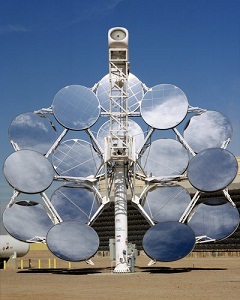New panel powers home, heats water
 Anyone who has accidentally jumped into a cold shower knows the value of hot water. Of course, it’s nice to have light to bathe in as well. Fortunately, there’s a new product on the market that solves the problem of attaining piping hot water and illuminating the room with light.
Anyone who has accidentally jumped into a cold shower knows the value of hot water. Of course, it’s nice to have light to bathe in as well. Fortunately, there’s a new product on the market that solves the problem of attaining piping hot water and illuminating the room with light.
Solar panels are on the move to take over the worlds energy demands with the introduction of a new system that both draws an electrical current to power lights, microwaves, and TVs, but also directly heats water.
Unlike typical solar hot water units that don’t actually generate an electrical current, some of the new panels available today combine the more commonly used photovoltaic (PV) solar cell and a hot water heating cell. By using this new technology solar panel manufacturers are now able to produce a product that is much more efficient, 10-15 times more efficient to put a recognizable value to it.
The solar thermal system is able to produce up to 15 times more energy because the design of the module uses the heated water and a trough like design lined with mirrors to recapture some of the light that bounces off the PV cell. Since the light ray that is converted into electricity is warped when it hits the water and reflected to a focal point by the mirrors, the PV cell has more time to absorb more rays.
“HelioTrough represents the future for parabolic through technology, and we expect it to be the cornerstone of our proposed solar thermal power plants in the southwestern United States," said Uwe T. Schmidt, chairman and chief executive officer of Solar Trust of America. "Thanks to the exceptional development and testing work by our colleagues at Flagsol, we are one step closer to providing performance and cost efficiencies not seen on the commercial market today."
The physics of the panel kill two birds with one stone, so to speak, and companies like Solar Trust of America are finally producing a product that will usher in a new era of solar energy applications for the home, business, and commercial/industrial production.
Homes may no longer need any gas services whatsoever, and industrial factories can cut back on burning coal for heating steel and glass furnaces, or in firing the bricks so many of our hoses are made of, for example. To end with a very intended pun, the sky’s the limit!



